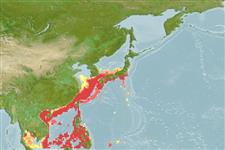Common names from other countries
Environment: milieu / climate zone / depth range / distribution range
Ecologia
; intervalo de profundidade 49 - 314 m (Ref. 4), usually 100 - 250 m (Ref. 4). Tropical; 14°C - 24°C (Ref. 112711), preferred 24°C (Ref. 107945); 38°N - 6°N, 99°E - 142°E (Ref. 4)
Western Pacific.
Length at first maturity / Tamanho / Peso / Idade
Maturity: Lm ? range ? - ? cm Max length : 23.0 cm TL macho/indeterminado; (Ref. 4)
It has a maximum total length of 23 cm; and a carapace length of 4 to 7.6 cm (male) and 4 to 8 cm (female), 6 to 8 cm (ovigerous female) (Ref. 4).
Life cycle and mating behavior
Maturidade | Reprodução | Desova | Ovos | Fecundidade | Larvas
Members of the order Decapoda are mostly gonochoric. Mating behavior: Precopulatory courtship ritual is common (through olfactory and tactile cues); usually indirect sperm transfer.
Holthuis, L.B. 1991. (Ref. 4)
Status na Lista Vermelha da IUCN (Ref. 130435: Version 2024-1)
Status no CITES (Ref. 108899)
Not Evaluated
Not Evaluated
Uso pelos humanos
Pescarias: espécies comerciais
FAO - pescarias: landings | FishSource | Sea Around Us
Ferramentas
Mais informação
Idade/Tamanho
Crescimento
Comprimento-peso
Comprimento-comprimento
Morfologia
Larvas
Abundância
Fontes da internet
Estimates based on models
Preferred temperature
(Ref.
115969): 17.5 - 26.7, mean 21.1 (based on 214 cells).
Vulnerabilidade
Low vulnerability (13 of 100).
